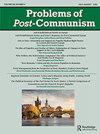Honest Broker or Status-Seeker: Russia’s Policy in Libya
IF 2
2区 社会学
Q2 POLITICAL SCIENCE
引用次数: 2
Abstract
ABSTRACT This paper examines Russia’s actions in Libya in the context of its pursuit of great power status. Drawing on a theoretical framework of Social Identity Theory, which had been developed and popularized in IR by the scholars Larson and Shevchenko, the article argues that Russia’s Libya policy consists of two strategies. First, it pursues social creativity through versatile diplomacy, which has positioned it as an invaluable mediator. Moreover, Russia relies also on social competition by supporting Libyan warlord Khalifa Haftar. While these strategies raised Russia’s profile, the ultimate success of status-seeking strategies depends on the recognition by the higher-status holders.诚实的中间人还是寻求地位的人:俄罗斯在利比亚的政策
本文考察了俄罗斯在追求大国地位的背景下在利比亚的行动。本文借鉴由拉尔森和舍甫琴科等学者在国际关系领域发展和推广的社会认同理论框架,认为俄罗斯的利比亚政策包括两个战略。首先,它通过多样化的外交追求社会创造力,这使它成为一个宝贵的调解人。此外,俄罗斯还通过支持利比亚军阀哈利法•哈夫塔尔(Khalifa Haftar)来依赖社会竞争。虽然这些战略提升了俄罗斯的形象,但谋求地位战略的最终成功取决于更高地位持有者的认可。
本文章由计算机程序翻译,如有差异,请以英文原文为准。
求助全文
约1分钟内获得全文
求助全文
来源期刊

Problems of Post-Communism
POLITICAL SCIENCE-
CiteScore
4.00
自引率
12.50%
发文量
33
期刊介绍:
The post-communist countries are the most rapidly changing societies of Europe and Asia. For insight into this twenty-first century revolution, there is no better source than Problems of Post-Communism. Emphasis is placed on timely research covering current economic, political, security, and international developments and trends in Russia and China, Central Europe and Central Asia, Latin America, and Southeast Asia. Clarity and readability make the articles fully accessible to researchers, policy makers, and students alike.
 求助内容:
求助内容: 应助结果提醒方式:
应助结果提醒方式:


